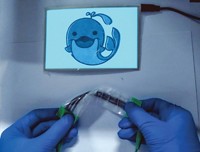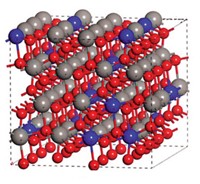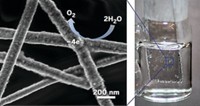Advertisement
Grab your lab coat. Let's get started
Welcome!
Welcome!
Create an account below to get 6 C&EN articles per month, receive newsletters and more - all free.
It seems this is your first time logging in online. Please enter the following information to continue.
As an ACS member you automatically get access to this site. All we need is few more details to create your reading experience.
Not you? Sign in with a different account.
Not you? Sign in with a different account.
ERROR 1
ERROR 1
ERROR 2
ERROR 2
ERROR 2
ERROR 2
ERROR 2
Password and Confirm password must match.
If you have an ACS member number, please enter it here so we can link this account to your membership. (optional)
ERROR 2
ACS values your privacy. By submitting your information, you are gaining access to C&EN and subscribing to our weekly newsletter. We use the information you provide to make your reading experience better, and we will never sell your data to third party members.
Energy
New Oxygen-Evolving Catalyst Unveiled
With an eye toward solar energy use, a nickel-borate catalyst could improve on the electrochemical splitting of water
by Stephen K. Ritter
May 24, 2010
| A version of this story appeared in
Volume 88, Issue 21
As part of an effort aimed at capturing the power of the sun to meet global energy needs, Daniel G. Nocera and coworkers at Massachusetts Institute of Technology have announced the discovery of a nickel-borate catalyst that improves on the electrochemical splitting of water. (Proc. Natl. Acad. Sci. USA, DOI: 10.1073/pnas.1001859107). Many scientists are developing catalysts that efficiently split water into hydrogen and oxygen, with the idea of using the hydrogen to power fuel cells. Nocera’s group previously reported a low-cost cobalt phosphate catalyst that it prepared as a thin-film electrode for the more difficult oxygen-producing half of the water-splitting process (C&EN, Aug. 4, 2008, page 7). In the new report, Nocera, Mircea Dinc˘a, and Yogesh Surendranath describe electrodepositing thin films of the nickel-based catalyst on a conductive glass substrate from a dilute solution of Ni2+ and a borate electrolyte. They note that the new catalyst is even less expensive and as efficient than its cobalt predecessor. The nickel-borate catalyst demonstrates that the cobalt original is not a unique, anomalous material, Nocera says. He adds that it also suggests that there might eventually be a family of related catalysts that researchers will be able to draw from to develop widely available storage technology for solar energy.





Join the conversation
Contact the reporter
Submit a Letter to the Editor for publication
Engage with us on Twitter